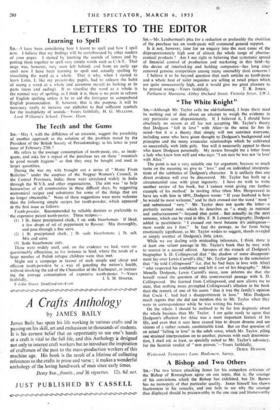" The White Knight" SIR,—Although Mr. Taylor calls me old-fashioned,
I hope there need be nothing out of date about an attempt to weigh the evidence in
any particular case dispassionately. If I believed it, I should have absolutely no reason at all for not accepting Mr. Taylor's theory. that Dodgson " fell in love " with Alice—in the sense be has in mind—but it is a theory that simply will not convince everyone, including some who have given thought to Dodgson's background and principles and the many avuncular relationships which he cultivated so successfully with little girls. Nor will it necessarily appeal to those who knew Dodgson personally. My review brought me a letter from a lady who knew him well and who says: am sure he was not 'in love' with Alice."
The point is not a very suitable one for argument, because so much
turns on the meaning we give to " love" and on individual interpreta- tions of the subtleties of Dodgson's character. It is unlikely that any direct evidence will ever be discovered. Mr. Taylor has built up a circumstantial case with great ingenuity. I have no wish to write another review of his book, but I -cannot resist giving one further example of his method?' In inviting Alice (then Mrs. Hargreaves) to have tea with him in 1891,d3odgtion wrote: "If your husband is here he would be most welcome," and he then crossed out the word " most " and-substituted " very."- Mr. Taylor does not- quote -the letter—a perfectly normal note, -which he describes as "a study in restraint and embarrassment."—beyond that poiur.,,-Ltut,-Actnally in -the next sentence, 'which can be read in Mrs. F. B. Lennorfg.biOgraphy, Dodgson added in parenthesis: " I crossed out most because it's ambiguous— most words are 1 fear." In fast the passage, so far from being emotionally significant, as Mr. Taylor wishes to suggest, stands revealed as simply another of. Dodgson's little jokes.
While we are dealing with misleading inferences, I -think- there is at least one salient passage in Mr. Taylor's book that he may wish to correct in a second edition. Apropos of the remark of Dodgson's biographer S. D. Collingwood that "the shadow of some disappoint- ment lay-over Lewis Carroll's life," Mr. Taylor jumps to the conclusion that "he told Collingwood" (i.e. that he had been in love with Alice) " who respected his confidence and. left it out of his biography." Miss Menella Dodgson, Lewis Carroll's niece,. now informs me that she herself raised the question of this -controversial- passage with S. D. Collingwood. She learned from Collingwood, and now allows me to
state, that nothing more prompted allusion in his bOok than: the remark of one of his aunts " that it was the family's opinion that Uncle C. had had a disappointment in love." Miss Dodgson much regrets that she did not mention this to Mr. Taylor when they were in correspondence while he was writing his book.
On the whole, 1 should be inclined to be far less dogmatic about
the whole business than Mr. Taylor. I am quite ready to agree that Dodgson's' affection for Alice was a most important feature of his life, and even that it may have caused him to dream dreams and see visions of a rather remote, unattainable kind. But on that question of an actual "falling in love" in the adult sense, which.Mr. Taylor, piling one strained interpretation on to another, pursues with-such determina- tion, I shall ask at least, as specially suited to Mr. Taylor's advocacy, for the Scottish verdict of " non proven."—Yours faithfully,
DEREK HUDSON.
Westwood. Tennyson's Lane. Haslemere, Surrey.


































 Previous page
Previous page